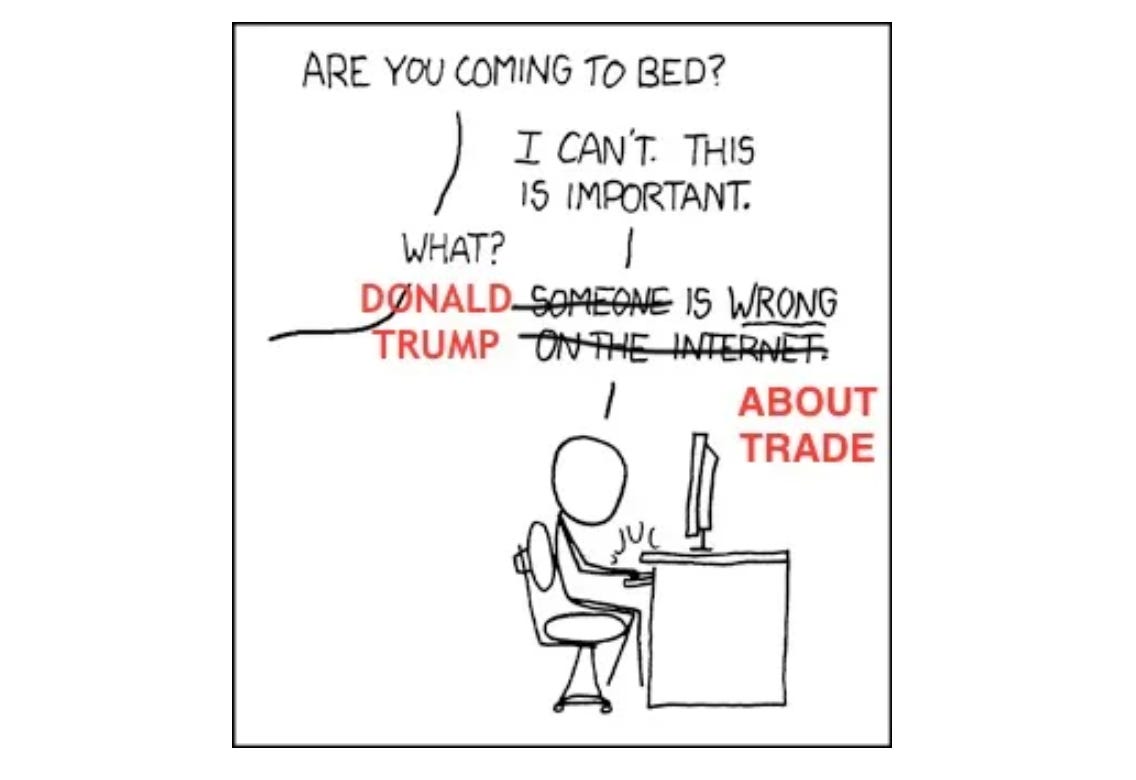The EU is a US success story
The European Union kept the peace, deterred the Soviets and purchased American goods. Why won't Donald Trump take credit?

“The European Union was formed in order to screw the United States. That’s the purpose of it. They have done a good job of it, but now I am president.”
Like many things Donald Trump says, and practically everything he asserts on the subject of trade, this is not true. But the President of the United States simply being wrong is not enough to justify another newsletter. It is the reason why he is wrong that I think is worth a few minutes of your time.
We are all vaguely aware that the EU (and its predecessor organisations) was created in response to the recurring and bloody conflicts that culminated in the Second World War. What began as the European Coal and Steel Community in 1951 through the Treaties of Rome and Maastricht became perhaps the most successful project for peace and prosperity in the history of the world. What is less well appreciated is the role of the United States in this project.
In the years following World War II, the US supported European integration as a means to “promote political reconciliation (especially between France and Germany), boost economic recovery, and prevent another catastrophic war on the European continent,” according to the Congressional Research Service.
In 1952, US Secretary of State Dean Acheson called the establishment of the European Coal and Steel Community “essential to lasting European security and prosperity”. Later, the administration of John F. Kennedy was strongly in favour of the formation of the European Economic Community, including support for British entry. If nothing else, a Europe of hundreds of millions of consumers would represent a large export market for American goods.
But European prosperity was also considered imperative in deterring the Soviet threat and securing the triumph of the democratic West. In a 1958 article for Foreign Affairs, Acheson predicted a world in which "a thriving Western Europe would continue its irresistible pull upon East Germany and Eastern Europe. This would, in turn, have its effect upon the demands of the Russian people on their government." Acheson foresaw that this might be followed by the reunification of Germany and "the return of real national identity to the countries of Eastern Europe." He was not far off.
Direct US financial support for Europe came in large part through the Marshall Plan. But European integration was a vital part of this. Indeed, it was a condition of receiving the aid. As John Van Oudenaren wrote it in his book, Uniting Europe: European Integration and the Post-Cold War World:
"The United States offered to provide Europe with money and goods, but only if the Europeans themselves came up with a plan for using the aid, and only if the plan was designed as a joint effort rather than a hodgepodge of national requests." Acheson really was not messing around. In fact, it was he who gave Robert Schuman, then French foreign minister, a deadline of May 1950 to come up with a plan for a federal system in Europe.
Inevitably, a richer and now expanded EU has grown better able to negotiate with (or nowadays, retaliate against) America. But the size of the bilateral relationship is evidence of its success. US total goods trade with the bloc was an estimated $975.9 billion in 2024. Together, the two economies represent almost 30% of global trade in goods and services and 43% of global GDP.
Trump is contemplating throwing that all away, which is a shame. But if nothing else, let’s not pretend the EU was established to “screw” the US. It was as much an American as a European invention.





Thank you for at, it filled in a couple of gaps.
The E.U. was a direct response of WW2 and America helped with Marshall Aid, even supplying Mules to farmers in Greece. As to Trump and people like Liz Truss who seem to believe that the majority of us, ordinary people, unlike lettuces, have little or no say in the running of the world. We are the Many, they are the Few and we will continue to exist when only the history books will remember them.